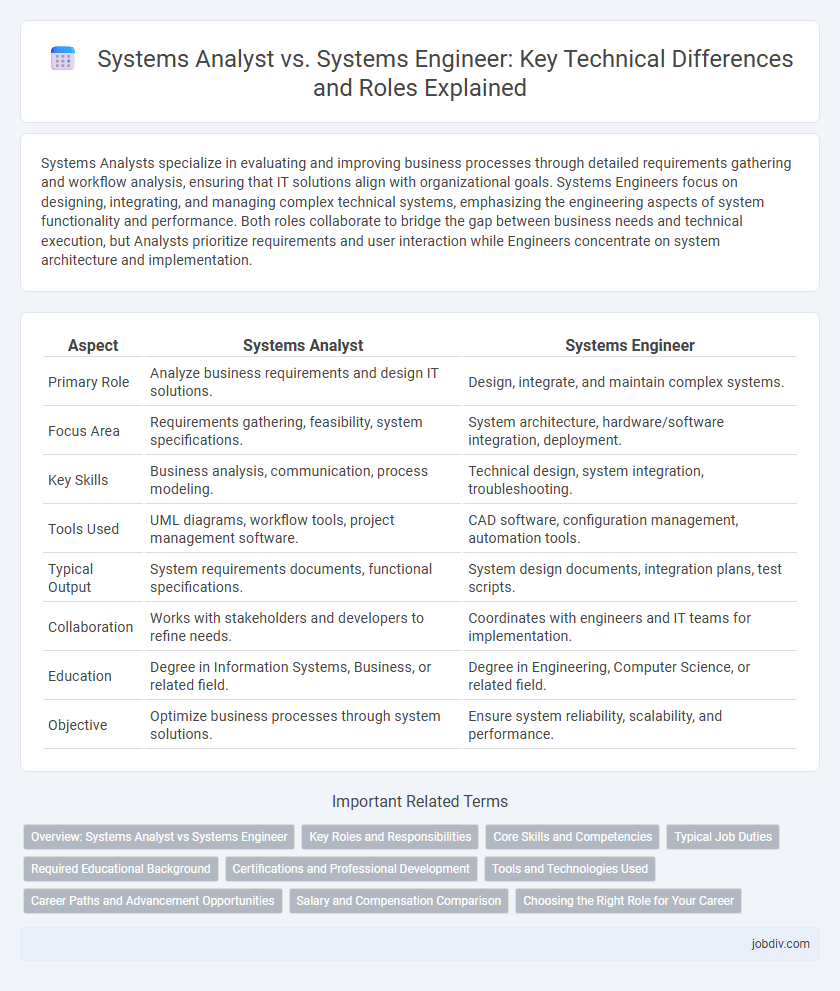Systems Analysts specialize in evaluating and improving business processes through detailed requirements gathering and workflow analysis, ensuring that IT solutions align with organizational goals. Systems Engineers focus on designing, integrating, and managing complex technical systems, emphasizing the engineering aspects of system functionality and performance. Both roles collaborate to bridge the gap between business needs and technical execution, but Analysts prioritize requirements and user interaction while Engineers concentrate on system architecture and implementation.
Table of Comparison
| Aspect | Systems Analyst | Systems Engineer |
|---|---|---|
| Primary Role | Analyze business requirements and design IT solutions. | Design, integrate, and maintain complex systems. |
| Focus Area | Requirements gathering, feasibility, system specifications. | System architecture, hardware/software integration, deployment. |
| Key Skills | Business analysis, communication, process modeling. | Technical design, system integration, troubleshooting. |
| Tools Used | UML diagrams, workflow tools, project management software. | CAD software, configuration management, automation tools. |
| Typical Output | System requirements documents, functional specifications. | System design documents, integration plans, test scripts. |
| Collaboration | Works with stakeholders and developers to refine needs. | Coordinates with engineers and IT teams for implementation. |
| Education | Degree in Information Systems, Business, or related field. | Degree in Engineering, Computer Science, or related field. |
| Objective | Optimize business processes through system solutions. | Ensure system reliability, scalability, and performance. |
Overview: Systems Analyst vs Systems Engineer
Systems Analysts specialize in evaluating business requirements and designing IT solutions that align with organizational goals, emphasizing process optimization and user interaction. Systems Engineers focus on developing, integrating, and maintaining complex system infrastructures, ensuring technical performance and reliability across hardware and software components. Both roles intersect in systems design but diverge in scope, with analysts concentrating on functional requirements and engineers on technical implementation.
Key Roles and Responsibilities
Systems Analysts specialize in evaluating and improving IT systems by gathering requirements, analyzing workflows, and designing solutions to enhance business processes. Systems Engineers focus on the end-to-end development, integration, and maintenance of complex systems, ensuring optimal performance, reliability, and scalability. Key responsibilities for Systems Analysts include stakeholder communication and requirements documentation, while Systems Engineers manage system architecture, hardware-software integration, and technical troubleshooting.
Core Skills and Competencies
Systems Analysts excel in requirements gathering, process modeling, and stakeholder communication, ensuring alignment between business needs and IT solutions. Systems Engineers specialize in system design, integration, and performance optimization, applying engineering principles to develop and maintain complex technical infrastructures. Both roles require strong analytical skills, but Systems Engineers demand deeper expertise in hardware, software, and network architecture, while Systems Analysts focus more on business analysis and user experience.
Typical Job Duties
Systems Analysts gather and analyze business requirements to design information systems that improve organizational efficiency, often collaborating with stakeholders to translate needs into technical specifications. Systems Engineers focus on designing, integrating, and managing complex systems throughout their life cycles, ensuring that hardware, software, and network components function cohesively. Both roles involve problem-solving and technical coordination, but Systems Analysts concentrate on aligning technology solutions with business goals, while Systems Engineers emphasize system architecture and performance optimization.
Required Educational Background
Systems Analysts typically require a bachelor's degree in computer science, information technology, or a related field, with emphasis on business processes and systems design. Systems Engineers often hold degrees in engineering disciplines such as electrical, software, or systems engineering, focusing on hardware integration and complex system development. Both roles benefit from certifications like Certified Systems Analyst (CSA) or INCOSE Systems Engineering Professional (CSEP) to validate specialized knowledge and skills.
Certifications and Professional Development
Systems Analysts often pursue certifications such as Certified Business Analysis Professional (CBAP) and Project Management Professional (PMP) to enhance their skills in requirements gathering and project coordination. Systems Engineers typically focus on certifications like INCOSE Certified Systems Engineering Professional (CSEP) and CompTIA Security+ to deepen expertise in systems design, integration, and cybersecurity. Both roles emphasize continuous professional development through industry conferences, specialized training programs, and cross-disciplinary skill advancement to stay current with evolving technologies and methodologies.
Tools and Technologies Used
Systems Analysts primarily utilize requirements management software, UML modeling tools, and business intelligence platforms to analyze and design system specifications. Systems Engineers employ configuration management tools, simulation software, and integrated development environments (IDEs) to develop, test, and maintain complex system architectures. Both roles leverage collaboration platforms like JIRA and Confluence to ensure seamless project communication and documentation.
Career Paths and Advancement Opportunities
Systems Analysts typically advance by deepening expertise in business analysis, project management, and specializing in industry-specific technologies, often progressing to roles such as IT consultant or business systems manager. Systems Engineers pursue career growth through mastering complex system integration, infrastructure design, and automation, leading to positions like lead systems architect or technical director. Both paths offer advancement in leadership and strategic roles, with Systems Analysts focusing on aligning IT solutions with business goals, while Systems Engineers emphasize technical innovation and system optimization.
Salary and Compensation Comparison
Systems Analysts typically earn an average salary ranging from $70,000 to $95,000 annually, influenced by factors such as experience and industry sector. Systems Engineers often command higher compensation, with averages between $85,000 and $120,000 per year, reflecting their broader technical scope and design responsibilities. Salary variations in both roles depend heavily on geographic location, certifications, and level of expertise in specialized systems technologies.
Choosing the Right Role for Your Career
Systems Analysts concentrate on evaluating and improving business processes through detailed requirements gathering and system specifications, making them ideal for professionals passionate about bridging business needs and technology solutions. Systems Engineers specialize in designing, integrating, and managing complex systems throughout their life cycles, best suited for those interested in technical architecture and system implementation. Selecting the right role depends on your strengths in analytical thinking versus technical design and your career goals within IT project management or systems development.
Systems Analyst vs Systems Engineer Infographic

 jobdiv.com
jobdiv.com